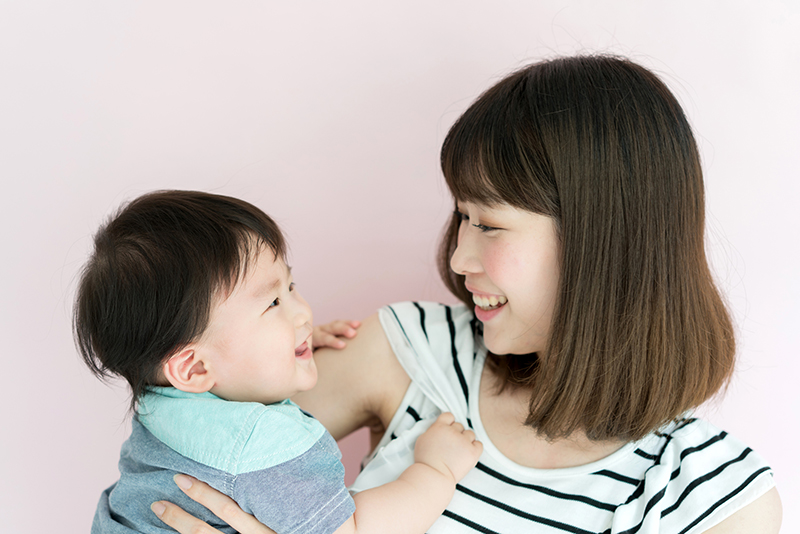Families For Life | Positive Attention and Your Child-Babies

DID YOU KNOW?
Cradle cap is the oily, scaly crust that babies sometimes get on their scalps, in their body folds and on their torsos. Although cradle cap looks uncomfortable, it doesn’t usually bother your baby.
READ MORE

Positive attention is when you respond to your child with warmth and interest. It helps your child feel secure and valued. Find out how to make the most of daily moments to show positive attention to your child.
What is positive attention?
Positive attention is the way you show delight in your child and warmth in your relationship through:
smiling at your child
making eye contact and using caring facial expressions
being physically gentle and caring with your child
using words to celebrate and encourage your child
showing interest in your child’s interests, activities and achievements.
Why positive attention is important
From birth, children need experiences and relationships that show them they’re valued, capable human beings who bring pleasure to others. Positive attention, reactions and responses from key grown-ups help children build a picture of how valued they are.
Your child’s self-image builds up over time with positive, loving messages from you and other important people in his life. A healthy self-image is very important, not only for your child’s relationship with others, but also for his confidence as he learns about the world.
Your child’s feelings of security and safety come from her interactions with you and the other people who care for her. If you reassure and support your child when she’s frightened, uncertain or faced with a new or unfamiliar situation, she’ll feel safe and secure.
All children do best in an environment where they’re supported, encouraged and enjoyed. They grow and develop through repeated, positive interactions in their first relationships.
How to show positive attention: all ages
You have many opportunities to give your child positive attention in your daily interactions together.
Daily activities like changing a diaper, supervising a bath or walking to school let you connect with your child in meaningful ways. For example, just giving your toddler cuddles and tickles while you’re drying him after a bath is a way of showing positive attention.
No matter what your child’s age, there are simple things you can do every day to send the message that your child is special and important. For example:
Look at your child and smile at her.
Show interest in what your child is doing – ask him to tell you about it if he can.
Pay attention and listen closely when your child talks to you.
Make up some special rituals you can share together.
There are also ways you can show positive attention to children of different ages.
Newborns and babies: positive attention tips
From the moment they’re born, children are paying attention to what you say and do – and how you say and do it. Even before babies can understand and use words, they respond to your tone of voice, gestures, facial expressions and body language.
Here are ways to give your baby positive attention:
Comfort your baby when she cries.
Smile back when your baby smiles.
Respond to the sounds your baby makes by saying something in return.
Chat about what’s going on around the two of you.
Notice what your baby is interested in and encourage him to explore – for example, show him how to shake a colourful rattle that has caught his eye.
Toddlers: positive attention tips
As your child gets older, she understands more of what you say, as well as how you say it. Here are some tips for positive attention at this age:
Tell your child exactly what you like about what he’s doing. For example, ‘I love it when you help to pick up the blocks’. Use a positive tone of voice to match the praise.
Get into the moment with your child. This could be as simple as squatting down to look at a caterpillar together.
When you’re talking together, leave time after you talk so your child can reply, even if she can’t always find the right words.
Pre-schoolers: positive attention tips
There are so many ways you can give your pre-schooler positive attention as he learns about the world. For example:
Make time to do your child’s favourite activities with her – for example, jigsaws, Lego®, painting and so on.
Give lots of feedback about the kinds of behaviour that you want to encourage – for example, ‘Thanks for bringing your plate to the kitchen. That makes it much quicker to tidy up after lunch’.
Remember to smile and make eye contact with your child when you greet him in the morning – perhaps even take a moment for a special cuddle.
School-age children: positive attention tips
Even though your child’s world expands when she goes to school, your warmth, love and positive attention are still the biggest influences on her development.
Try these ideas:
Stop what you’re doing and listen when your child wants to talk about his day at school. This might not always be as soon as he gets home, though – it might be when he’s in the bath or just before he goes to sleep.
Ask follow-up questions when your child starts talking. This keeps the conversation going.
Notice and guide your child’s positive interactions with others – for example, ‘I think Selvi really liked it when you asked her questions about her holiday. It gave her a chance to talk about something that was important to her’.
Before you correct your child, ask yourself: does it really matter, or could I just let it go? If you’re always correcting your child, this sends the message that your child isn’t capable or valued.
When it’s hard to be positive
It’s not realistic or even normal to be positive all the time. And your child will cope just fine if you’re occasionally insensitive, unavailable or distracted.
It’s what happens over time, not each particular incident, that makes the difference. If your child gets mostly positive attention from you over time, he’ll feel loved and secure.
When parents are regularly distracted or can’t focus on their children’s needs, children can be negatively affected. If this begins at infancy and keeps happening, babies as young as six months can show signs of stress. This can affect children’s health and wellbeing in the early years as well as in the future.
If many of your daily interactions with your child are negative, or if it’s hard for you to feel or act positively with your child, it’s worth seeking professional help. Start by seeing your General Practitioner (GP) or a counsellor. These professionals can help you fix things with your child and get your relationship back on track – your relationship might even end up stronger.
© raisingchildren.net.au, translated and adapted with permission
Explore more